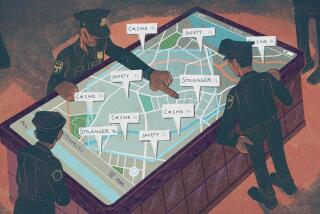New ‘Distinctive Ringing’ Lets Consumers Decide Whether Call Is From Friend or Pest : From Whom the Bell Tolls
- Share via
SAN FRANCISCO — Picture this: You’re sitting in the office waiting for that make-or-break phone call from a key customer. The phone rings, you lunge to answer--and it turns out to be just another annoying solicitation from a fast-talking commodities salesman.
Or this: You’re trying to soothe your jangled nerves after a long day at the office. You stretch out on the couch and turn on the tube. As Vanna comes on, the phone rings--and for the fifth time that evening, you are forced to get up and take a message for your teen-age daughter.
Sound familiar? Help is on the way. The regional operating telephone companies--the folks who brought you such custom services as call forwarding and call waiting--say they have a solution. It is called “distinctive ringing”--and its promoters claim it will allow people to determine whether to answer a phone call just by the sound of the ring.
In recent weeks, phone companies around the country have been jumping on the bandwagon. BellSouth calls its version “Ring Master.” At Bell Atlantic, it’s “Identa-Ring.”
At California’s Pacific Telephone, “priority ringing” will be offered beginning next year as part of a sophisticated package called “CLASS”--an acronym for Custom Local Area Signaling Services. GTE California also is installing CLASS, and it will be available in selected areas in the third quarter of this year.
Already, internal phone networks at many companies have distinctive ringing capabilities. A normal ring might indicate a call from the outside; two short bursts, an inside call, and three rings, a priority call from the boss.
Local phone companies expect to ring up millions of dollars in new revenue with the service. BellSouth forecasts $40 million in additional annual revenue from Ring Master by 1990. Bell Atlantic expects 15% of its customers to sign up for Identa-Ring by 1995 and predicts revenue over the first five years of $100 million. Both plan to charge residential customers about $4 a month for the service.
But the rosy forecasts don’t ring true to some industry observers. “I don’t hear much demand for distinctive ringing,” said Wallis O. Victory, a Mill Valley, Calif., telecommunications consultant. At best, he added, the service might appeal to “people who are gadget- or gimmick-oriented.”
“What is a businessman going to do? Take calls from his best customers and ignore calls from new prospects?” he asked.
Added Bruce Hyman, a telecommunications analyst for Fitch Investors Service in New York: “Distinctive ringing is a nice, neat thing. But I doubt that more than 5% of a company’s subscribers will ever sign up for it.”
People who want to avoid annoying phone calls already have a number of options, he noted. They can monitor incoming calls with a telephone answering machine, for example. Or they can put in a second line for their teen-agers, though the phone companies point out that a second line costs much more than distinctive ringing.
The technology for the kind of distinctive ringing BellSouth and Bell Atlantic are introducing isn’t particularly advanced.
Indeed, the basic technology is little changed from the old-fashioned party line.
Under the system, each telephone line can be assigned up to three telephone numbers. When dialed, each number produces its own, distinctive ring--say, two or three short trills instead of the normal ringing pattern. A household with three roommates could assign a different phone number to each roommate.
“Basically, it is made possible by installing new software in our AT&T; and Northern Telecom switches,” explained John Seazholtz, vice president for technology and marketing of Bell Atlantic.
The CLASS system, which Pacific Bell and other regional phone companies plan to offer, incorporates technology that is far more advanced. CLASS services are based on the installation of a network that will be parallel to the existing voice network.
Under CLASS, “the calling party’s phone number is routed along with the call,” explained Elena Worrall, district manager of Bellcore, which provides research and other technical support to seven regional telephone companies.
Aid to Businesses
As a result, the phone to which the call is placed can “read” the incoming number and deal with the call in the appropriate manner. If the call is from one of up to a dozen preprogrammed phone numbers--your boss’, for example, or your best customer’s--your phone will give you the distinctive priority ring. If the phone does not recognize the incoming number, the ring would be normal.
CLASS will likely be far more lucrative than party-line-type distinctive ringing. “It’s light years ahead,” said Hyman, who noted that a business would be able to know who is calling--and retrieve relevant account information--even before the phone is answered.
Other CLASS features will include selective call forwarding, automatic recall of the last incoming phone call and selective call blocking. If you’re a deadbeat, call blocking could be used to avoid dunning calls from collection agencies.
And what better way, asks spokesman Scott Smith of Pacific Bell, to deal with jilted lovers or pesky bosses?
DR, MATT WUERKER / for The Times
More to Read
Inside the business of entertainment
The Wide Shot brings you news, analysis and insights on everything from streaming wars to production — and what it all means for the future.
You may occasionally receive promotional content from the Los Angeles Times.










